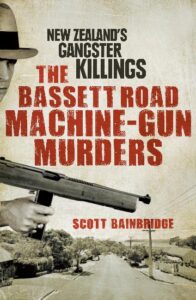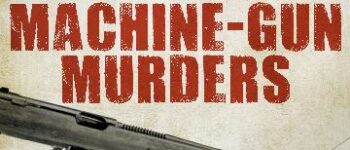1963: Bassett Road Machine-gun Murders
December 7, 2021
By AHNZ
 Today in New Zealand history, 7 December, 1963, a dispute in the hospitality industry led to two men being shot dead at 115 Bassett Road, Remuera, Auckland. The murder weapon was set to single shot mode not rapid fire but the type of weapon fed into the gangster romance that made the case infamous. That, and the fact that the killings were part of a hospitality industry that had been turned into a violent black market thanks to government intervention and this event showed it was boiling over.
Today in New Zealand history, 7 December, 1963, a dispute in the hospitality industry led to two men being shot dead at 115 Bassett Road, Remuera, Auckland. The murder weapon was set to single shot mode not rapid fire but the type of weapon fed into the gangster romance that made the case infamous. That, and the fact that the killings were part of a hospitality industry that had been turned into a violent black market thanks to government intervention and this event showed it was boiling over.
Organised Crime absolutely requires and depends upon government and police involvement and even cooperation. Prohibition is the lifeblood of crime. As much as Victimhood Culture Woke Wowsers are behind such social controlling measures the criminals are right there with them. Both of these unlikely allies gain by having a government control a substance. The ‘Bootleggers’ or Beerhouses or other drug deals have much to gain by a criminalised product and much to lose by decriminalisation.
William Massey’s Government passed the Sale of Liquor Registration Act in December 1917 seeking an 8pm closing time for alcohol sales that became a 6pm one in the course of the legislative debate. This temporary measure instead extended another 50 years. The immediate effect was to create generations of men who rushed from work to the pub so they could drink as quickly as they could before the clock struck 6. The law super-charged habitual binge drinking by what became known as The Six O’Clock Swill.
Government had not eliminated the desire for New Zealanders to consume hospitality services after 6pm at all. It had only shifted it outside of the legal realm and into the criminal one. This also stunted New Zealand’s hospitality sector in development in relation to the rest of the Western World. Another effect was that legal pubs were artificially created and sustained according to their proximity to work sites which meant that there were many more establishments than otherwise needed (especially on the West Coast.) Yet another was that alcohol and food was basic and retrograde. Beer itself was boring brown bromide. Staff were stiff and unaccommodating. All of this would change in 1967 but a catalyst, perhaps the catalyst, was what happened on Bassett Road.
Bassett Road had been one of these Beerhouses since about the 1940s, run by various criminals. Because hospitality establishments like these were part of the Black Market their competition involved violence. In the Free Market the hospitality sector competes on things like price and quality and location and advertising and friendly service. In the Black Market it’s normal to threaten or damage or even shoot at rival establishments.
“The State is at its most harmful to the population when there is a confluence of moralists and mafia; Bootleggers and Baptists. A law that has the simultaneous backing of moralising do-gooders AND Rent-Seeking Crapitalists who stand to gain millions of dollars is bound to be passed.” – 1994: The Stackhat Deception, AHNZ
“It was said the pair had set up a “sly grog den and resort for criminals” in a time when pubs closed early. A roulette wheel and two dozen beer glasses were found at the scene.” – Two dead while the washing hung on the line, Stuff
“As soon as 6pm closing began in 1917, sly-grog dens opened, literally overnight, in towns all around the country….Beerhouses were owned and operated by people flouting the law to make a quick buck…For the police, beerhouses were nothing more than an annoyance as many officers viewed the liquor legislation with disdain, and willingly turned a blind eye to the beerhouse operations. There was reluctance to invest time, manpower and resources in what was regarded as petty offending.” – Bainbridge (2013)
Apart from anything else that may have been going on, the Bassett Road murders took place in the context of rival hospitality service providers in a Black Market industry created by The State. The dead, Walker and Speight, as well as the murderers, Jorgensen and Gillies, were part of that perverted hospitality sector. So were hundreds of others, including father and son team Archie and John Banks (politician.)
Only The State made the Bassett Road Machine-Gun Murders possible. The legislation was there, the anti-alcohol Wowsers were there, the crime-entrepreners were there. Usually, I think, the competition didn’t involve murders but the help of the government’s own police. The police would turn a blind eye to some beerhouses and storm others according to who was in and who was out. Beerhouses, like gangs and their drug trade today, were well known to the constabulary but were left free to operate provided they paid their dues to the police. If a rival criminal outfit wanted to shut down a beerhouse start-up company it would have some of their New Zealand Police Force cohorts make some arrests, I speculate. This was a far more direct form of warfare than today because firms would be able to bribe police action directly and off the books. Today the same thing might be achieved transparently and legally by paying some tax or levee to a bureaucrat over and above what an entry-level firm could afford and it would be disguised as “compliance costs” or “resource consent” or “licensing” or “health and safety.” However, having official police shut down the competition made for a more civilised and orderly society than criminals fighting among themselves.
That Jorgensen and Gillies did their own policing suggests that the Remuera Police were unavailable either because they were too expensive or perhaps short-handed when required for the Bassett Road job. Bassett Road, in my opinion, ruined the racket for this entire criminal sector of the hospitality industry by exposing what was going on into the public eye. This led to reforms. In particular, the 6pm closing time rule that Beerhouses relied upon was finally overturned 4 years after on 9th of October 1967 which unleashed 50 years of suppressed hospitality development.
—
Ref. The Bassett Road Machine-Gun Murders, Scott Bainbridge 2013
Note: The Silent Generation “As a generation they seem to have produced a disproportionate amount of mass murderers and simultaneously the first generation of pop culture killers as well.” And, “The Unabomber 1942, Gacy 1942, Richard Speck 1941, Charles Manson 1934, Boston Strangler 1931.” – Ref. Philip Romanow, The Fourth Turning discussion group, Facebook (2023)
2 thoughts on "1963: Bassett Road Machine-gun Murders"
Leave a Reply
 Like Comment Share
Like Comment Share






It tarred Bassett Road forever. I moved there from Wellington in 1994 and the first reaction when I told friends of our new address was a reference to the murders. And it still happens 27 years further on!
I was working there about 10ys after you moved in and I don’t think ‘tarred’ is the right word. My impression is more that it’s novel, part of a richer history. Hint of danger and infamy to keep the fainthearted away if they are intimidated by Remuera’s wealth and lavish houses and the odd murder. Like Victoria Park in the Christchurch Hills where the Parker-Hulme murder occurred, or the severed heads of Ngai Tahu’s vanquished on another of the Port Hills, it’s not tarred but accented.
This is surely better. We’re living with our history in these cases rather than burning it down as we have done for the Bain and Graham houses. Also Schlaepfer and Gray if I remember correctly.